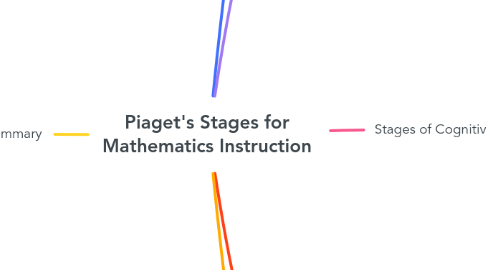Piaget's Stages for Mathematics Instruction
by Faiz Awang


1. Summary
1.1. Recaps stages of cognitive development
1.2. Relates Piaget's theory to mathematics instruction
1.3. Stresses the value of stage-appropriate activities
2. Introduction to Jean Piaget
2.1. Explored cognitive development in children
2.2. Introduced genetic epistemology
2.3. Used conversation to understand children's thinking
3. Underlying Assumptions
3.1. Thought processes transform continuously
3.2. Development unfolds in distinct stages
3.3. Progress influenced by maturity, experience, culture, ability
4. Stages of Cognitive Development
4.1. Sensorimotor Stage
4.1.1. Emphasizes object permanence
4.1.2. Introduction to numerical concepts
4.1.3. Hands-on and counting experiences
4.2. Preoperational Stage
4.2.1. Focuses on symbolic thought
4.2.2. Challenges in logical reasoning
4.2.3. Problem-solving with available materials
4.3. Concrete Operations Stage
4.3.1. Develops seriation and classification skills
4.3.2. Uses manipulatives for concrete understanding
4.4. Formal Operations Stage
4.4.1. Advances to abstract thought
4.4.2. Engages in hypothesis formation and reasoning
4.4.3. Problem-solving with complex scenarios
